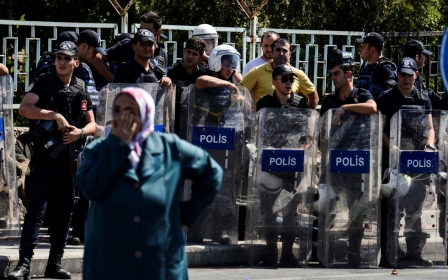The briefcase war: How Gulen group worked from the inside to seize power

On 13 March 2014, a meeting was held in the office of the then-Turkish foreign minister, Ahmet Davutoglu, attended by several top Turkish state officials.
The meeting, which Davutoglu chaired, was attended by Hakan Fidan, head of Turkish Intelligence Services, General Yashar Guller, deputy chief of staff of the armed forces, and Fridon Sinirli Oglu, director general of the Foreign Ministry.
There has almost been nothing like the Gulenist operation in the modern region, either within Islamic political forces, nor among leftists or liberals
Apart from Davutoglu, who was a political personality by virture of his Justice and Development Party membership and his role as a Turkish parliamentarian, all the other men in the meeting were members of the political and military bureaucracies. In other words, none of them had a political designation or affiliation.
The group discussed issues pertaining to Turkish policy and its affects on the Syrian crisis and debated whether Turkey should intervene in the war.
Infiltration operations
A few months before this gathering and in the wake of tensions that had built up for more than two years, a conflict erupted on 17 December 2013 between Fethullah Gulen's group and the Justice and Development government. Gulen's group had tried to use its levers within the judiciary and the prosecution to bring down then-prime minister Recep Tayyip Erdogan and several cabinet members in order to create a governance vacuum.
The Gulen group started making accusations of corruption against several Justice and Development personalities and ministers and also against businessmen known for their close association with ruling party circles and their hostility toward the group.
The government thwarted the Gulenist operation, adopting a series of measures including the resignation of the ministers against whom charges of corruption were made. The firm position adopted by the new minister of interior, Afkan Alaa, played an important role in this regard.
A few months later, the two prosecutors who exercised their powers to launch the operation fled to Germany after the exposure of their links to the Gulen group.
However, what the country witnessed in December 2013 shed light on the depth of the group’s infiltration into the state apparatus and the size of the spying and eavesdropping operations it was undertaking in all state and government departments and against thousands of politicians, academicians and businessmen.
Spying tools exposed
On 23 March 2014, that is just 10 days after the meeting of the top statesmen in the foreign minister’s office, the Turkish forces shot down a Syrian plane that had just violated Turkish airspace.
Amid the climate of tension that accompanied the downing of the Syrian plane, Kanal Turk private TV channel broadcast a segment of the discussion that took place during the meeting that discussed Turkish policy in Syria. Afterwards, an abundance of evidence linking Kanal Turk to the Gulen group became available which eventually led to the channel being shut down.
But what the station had broadcast was sufficient to make the Turkish security authorities realise that the group had no hesitation to spy on the state’s most sensitive and secretive departments and that it had the tools and the means to do just that.
It is known that the foreign minister’s office, where the meeting was held, is situated in one of the most secure floors within the building of the ministry and that the office (and the entire floor for that matter) is not only subjected to regular sweeps for eavesdropping devices , but also boasts a comprehensive spy-proof protection system.
How then could the Gulen group have succeeded in recording what went on inside the meeting?
The investigation into the leak, which lasted several weeks, could not find an answer to this question, nor could it determine who carried out the spying process.
One of the explanations given by the state’s security apparatuses for such a serious breach is that the spying was carried out using a traditional eavesdropping device that was installed inside the foreign minister’s office before the meeting and was removed soon after it was over.
However, after analysing the sound on the tape that was broadcast by Kanal Turk, a technological analysis group concluded that the eavesdropping device was closer to the floor of the foreign minister’s office than to an elevated position inside it, such as his office desk and this favoured the theory that the device must have been planted in a briefcase of someone who attended the meeting.
A colonel's confession
The failure of the 15 July coup attempt led to the arrest of a large number of individuals who were embroiled in the attempt. Their arrest took place either during the confrontation with the coup plotters or upon the availability of evidence that proved their association with the coup following its failure.
One of those caught in the act was Colonel Levent Turkan, special assistant to the chief of staff of the armed forces, General Hulusi Akar. He was the one who led the operation to kidnap Akar and held him hostage during the early minutes of the coup attempt.
Turkan, who expressed sorrow for what he did, confessed that he had been a Gulenist for 30 years and depicted a shocking picture of the enormity of the size of the group’s activities within the army. For many years, Turkan and several low- and middle-ranking Joint Staff Command officers, who are Gulen group members, spied on Akar, his predecessor, the deputy chief of staff and all the top officers who were not Gulenists, particularly those who occupied important positions within the Joint Staff Command.
Turkan also confessed that he used to hand over recording tapes once every two weeks to a senior official within the group stationed in the capital, Ankara. It is worth noting that all those who worked for the Joint Staff Command, from the chief of staff to the lowest ranking officer, including those who perpetrated the crime of eavesdropping, were not politicians but statesmen or members of what is known as the military bureaucracy.
In the end, Turkan's confessions have helped shed light on the ambiguity that surrounded the eavesdropping operation on the March 2014 meeting at the foreign minister’s office. The eavesdropping device used was most likely planted by a Gulenist officer inside the briefcase of the deputy chief of staff General Guler. The device would have been removed from the briefcase following Guler’s return to his office at the Joint Staff Command.
Rare model
So, what is the significance of this aspect of the Gulen group’s activities? It is not unusual for a political group to try to undermine or weaken its political foes at times using legal and moral political means and, at other times, using utterly immoral and illegal means.
No one knows with certainty what the group was going to do with such enormous heaps of data made available to it through its spying on state institutions
Yet, it is a completely different affair when a political group acts in earnest, from the shadows and on the ground of a modern state system to undermine, the edifice of that system and weaken it through continuous and well-planned efforts.
Eavesdropping on businessmen, politicians, academics and judges provided the group with abject blackmail tools. In many instances, such activities ended up ruining families and public figures, both men and women. But no one knows with certainty what the group was going to do with such enormous heaps of data made available to it through its spying on state institutions, including the military.
As investigations have shown so far, the Gulen group targeted the Justice and Development Party and other parties that are not in government such as the People’s Republican Party and the Nationalist Movement. It also sought to infiltrate small radical groups.
Yet, prior to that, and above all, it has targeted the edifice of the Turkish state itself: the judiciary, the prosecution, all the branches and departments of the ministries of interior and education, all the branches of the Turkish armed forces and the forces of the gendarmerie.
Normally, political groups seek to achieve a legitimate existence that is recognised by the country’s law. But the Gulen group has been keen, throughout its history, to remain secret and to act and expand clandestinely, away from the observation of the law or public opinion.
The group's secrecy was not restricted to its organisational structure but also, and more dangerously - and of more cause for concern - to its ideological and doctrinal structure. There has almost been nothing like it in the modern region, either within Islamic political forces, nor among leftists or liberals.
- Basheer Nafi is a senior research fellow at Al Jazeera Centre for Studies.
The views expressed in this article belong to the author and do not necessarily reflect the editorial policy of Middle East Eye.
Photo: A Turkish protester holds up a banner with pictures of Turkish Prime Minister Recep Tayyip Erdogan and the US-based Turkish cleric Fethullah Gulen during a demonstration against goverment on 30 December 2013 in Istanbul (AFP)
This article is available in French on Middle East Eye French edition.
Stay informed with MEE's newsletters
Sign up to get the latest alerts, insights and analysis, starting with Turkey Unpacked
Middle East Eye delivers independent and unrivalled coverage and analysis of the Middle East, North Africa and beyond. To learn more about republishing this content and the associated fees, please fill out this form. More about MEE can be found here.





